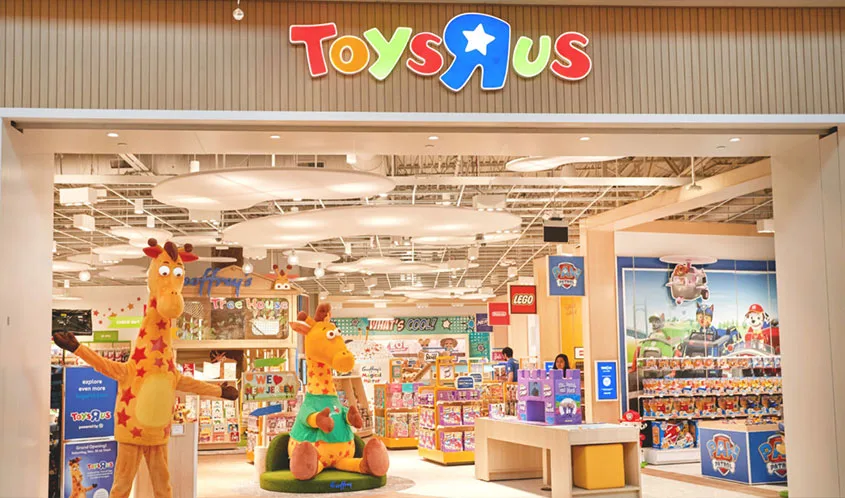Eighteen months ago, Toys “R” Us was seemingly closing the books in the U.S. on a 70-year legacy for the company. Founded by Charles Lazarus, Toys “R” Us grew from a single Children’s Bargain Town into “The World’s Biggest Toy Store,” known to families around the globe.
The flameout was spectacular: an unexpected and rapid decline that followed years of simmering problems that finally bubbled over the top. Crippled by massive debt from a leveraged buyout, the company didn’t invest in its stores and infrastructure until it was too late, which, paired with smaller missteps, resulted in tarnished consumer perception and the company’s ultimate failure to survive reorganization via bankruptcy. It finally shuttered its U.S. stores in June 2018.
When the owners of the Toys “R” Us IP reemerged as Tru Kids Brands — the new parent of Toys “R” Us, Babies “R” Us, Geoffrey the Giraffe, and more than 20 established toy and baby brands — ahead of Toy Fair New York last year, the industry reaction was mixed at best. Rumors and speculation fueled by offhand remarks and announcements devoid of real information brought forth strong opinions from many who felt they’d been personally burned in the collapse. Basic Fun! CEO Jay Foreman — whose company lost millions in the collapse — was among the most outspoken. “I’m certainly skeptical when I read a statement like ‘new management team,’ ” he told the New York Post. “These are the same leaders and same financial partners that were around for the demise of the company.”
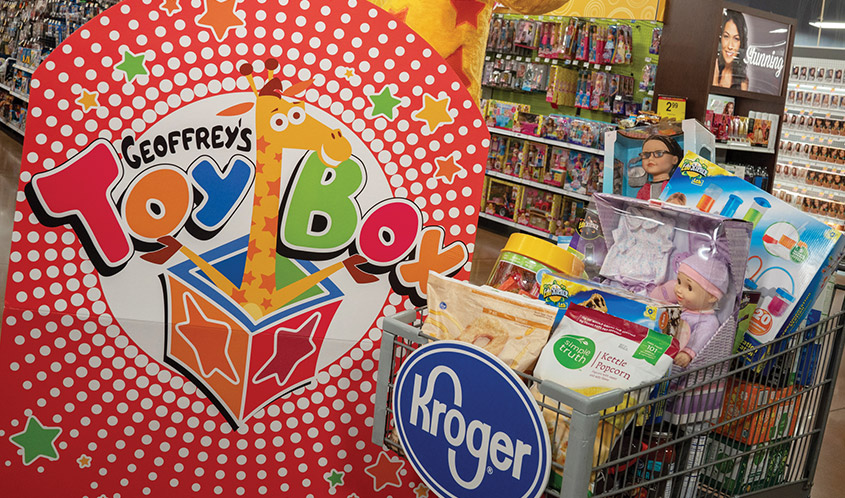
First Signs of a Comeback
Geoffrey the Giraffe made an appearance at Toy Fair Dallas 2018 just four months after the closure. The unannounced visit from the 7-foot character took many by surprise. “At the time, I didn’t know whether to hug him or to punch him in the stomach,” says Richard Gottlieb of Global Toy Experts. “He was too tall to punch in the face.”
Geoffrey’s Toy Box kept the house brands in front of consumers to a limited extent during the first holiday season without the parent company. Pallet shippers and endcap displays featuring Journey Girls and Imaginarium products surfaced at regional retailers, including Kroger grocery stores and the recently shuttered Shopko.
Popping up in other retailers is one thing, but how could Tru Kids Brands resurrect Toys “R” Us in “a completely new and reimagined way,” as promised by Tru Kids’ president and CEO Richard Barry, the former chief merchandising officer at the previous incarnation of the company?
It’s all about partnerships, and the company planted the first seeds overseas.
TRU Down Under
In June, Tru Kids revealed a partnership with Hobby Warehouse to relaunch Toys “R” Us and Babies “R” Us in Australia and, for the first time, New Zealand. The immediate focus was placed on e-commerce, with Hobby Warehouse operating new websites for both brands under license from the U.S. parent. Pending the success of the online endeavor, Hobby Warehouse says it plans to launch physical Toys “R” Us and Babies “R” Us “experience centers” this year.
“Our mission is to encourage children to engage with as many forms of play as we possibly can,” says Hobby Warehouse CEO Louis Mittoni. “Hobby Warehouse is a digital native with a keen understanding of how to accelerate and match the requirements of the modern shopper.”
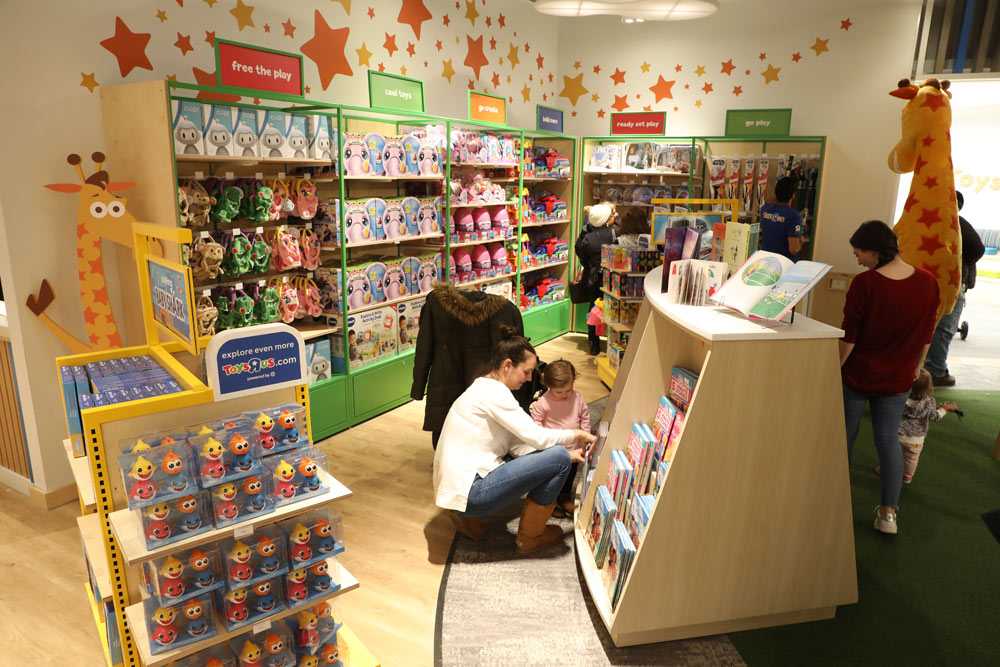
The TRU x b8ta Equation
In July, Tru Kids teamed up with software-powered experiential retailer b8ta on plans to bring Toys “R” Us stores back to the U.S. with a pair of stores located at the Galleria in Houston, a Simon Mall, and in Westfield Garden State Plaza in Paramus, New Jersey. The small-scale stores are big on experiences and open play spaces, where kids can experience new toys out of the box. At its core, the new stores leverage b8ta’s Retail as a Service (RaaS) platform, which “enables brands to actively manage their in-store experiences and measure how offline experiences translate into online sales.” Those brands invest in their own spaces within the stores.
In September, Jamie Uitdenhowen — fresh from a stint as chief merchandising officer at Party City — rejoined Toys “R” Us as president of Toy Retail Showrooms, a new joint venture created to operate and manage the new Toys “R” Us stores in the U.S. Uitdenhowen previously served as vice president and general manager at Toys “R” Us, overseeing all merchandising decisions. At Party City, Uitdenhowen led the Toy City initiative, which included 50 seasonal pop-up stores that sought to capture lost TRU market share for the 2018 holiday season.

The Instagrammable Experience: TRU x Candytopia
In October, the Toys “R” Us Adventure opened two limited-run engagements in Chicago and Atlanta. The joint effort in collaboration with Candytopia is a multisensory play space. Schleich, Spin Master, and Melissa & Doug signed on to sponsor themed experience rooms: a PAW Patrol Adventure Bay lookout tower and photo-op, a Melissa & Doug play area, and a Schleich jungle in which kids can pretend to outrun a T. rex. Each experience also includes opportunities to dance and play with Geoffrey before taking a leap into a massive ball pit. While not a store, specifically, a small gift shop offers families a chance to purchase toys from participating sponsors.
Response to the first experiences has been mixed, with consumer criticism pointing to the ticket prices, which are $28 for adults and $20 for kids, meaning that the hour-long visit for a family of four is a $96 investment, not counting parking. The Chicago Tribune compared the event to a children’s museum, and called it “a branding experiment masquerading as a play space.“
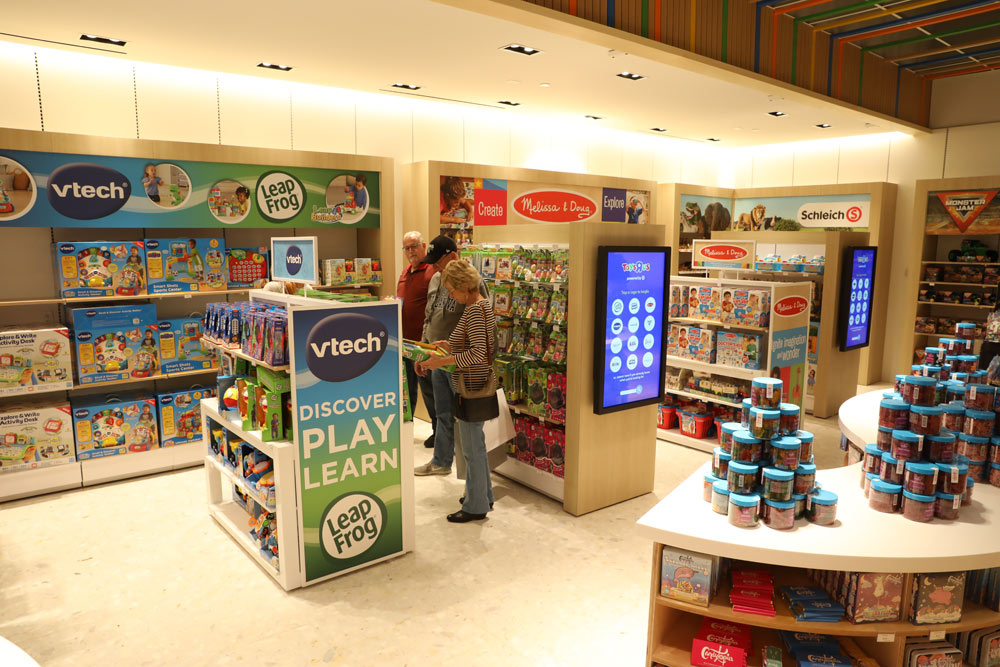
If You Can’t Beat ‘Em: TRU x Target
One of the biggest questions regarding the U.S. relaunch of Toys “R” Us was answered when Target came on board to power sales through the Toys “R” Us website and for online orders placed in store. Fulfillment was long regarded as perhaps the biggest challenge, considering that the infrastructure of the original company was dismantled.
“Our U.S. strategy is to bring back the Toys ‘R’ Us brand in a modern way through a strong experiential and content-rich omnichannel concept,” Barry says. “The foundation of that strategy requires the help of a retail industry leader, and Target is the ideal retailer to support a new Toys ‘R’ Us shopping experience, which is designed to provide families with endless ways to discover, play, and enjoy toys. Target will help us deliver on that experience with its toy assortment, digital strength, and ability to deliver orders to shoppers in a matter of hours.”
“How the times have changed in retail,” wrote Target’s Senior Strategist of Brand Marketing Michael Abata in a LinkedIn post following the news, hashtagging it with “#IfYouCantBeatEmJoinEm.”
At press time, the jury was still out regarding whether or not the collaboration was beneficial beyond helping Target capture some additional sales via the Toys “R” Us website, which, despite being devoid of content for nearly two years, was still pulling in a large amount of traffic. In essence, it’s running via an affiliate model, with the biggest benefit to Toys “R” Us seeming to be the in-store ordering option being offered at its new retail locations.
“Target’s leadership in toys, digital, and fulfillment are an unbeatable platform for Toys ‘R’ Us to reconnect with their fans while we introduce them to the ease and convenience of shopping at Target,” said Nikhil Nayar, senior vice president of merchandising at Target, in a release accompanying the initial partnership announcement.
The Future
Just in time for Black Friday, Tru Kids Brands’ first new Toys “R” Us store opened for business in New Jersey, with the Texas location following a week later.
The lean, 6,500-square-foot stores are staffed by “PlayPros” and feature an assortment of toys, games, and books from Hasbro, Mattel, MGA Entertainment, Spin Master, Moose Toys, Schleich, LEGO, Nintendo, and others. Top brands include L.O.L. Surprise!, Fisher-Price, Baby Shark, Monster Jam, Barbie, and more, with the opening timed to the peak selling period for licensed product based on Frozen 2 and Star Wars: The Rise of Skywalker. Still, some brands are conspicuously absent, such as Funko.
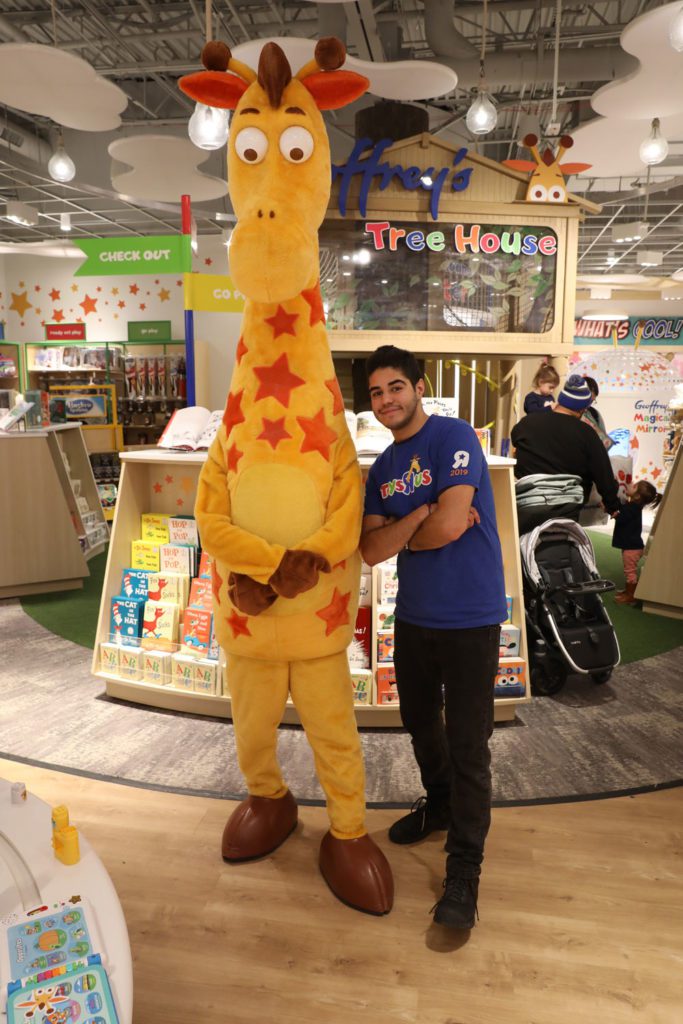
The initial reaction from consumers is overwhelmingly positive, with long lines seen throughout the holiday season. According to Uitdenhowen, hands-on demos are moving product, with Spin Master’s Juno My Baby Elephant the first sell-out item.
While two stores will hardly move the needle for the toy industry, a successful national chain is something that’s sorely missing in the U.S. and would be welcomed. Tru Kids expects to open as many as 10 new stores in top markets this year.
Now the focus moves toward Toy Fair New York and whether or not the industry is ready to offer full support to the reinvented Toys “R” Us 2.0. Can Geoffrey reclaim his toy retailing throne with a new concept based on interactive experiences?
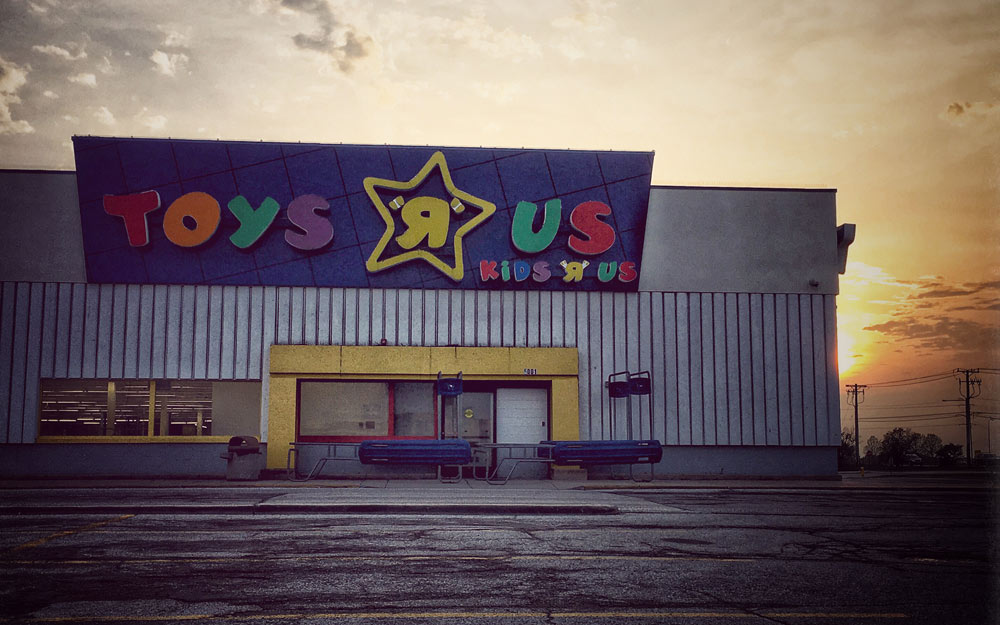
How the Toys “R” Us Closure is Reshaping Retail as We Know It
When the sun set on Toys “R” Us, the fallout was unprecedented. For each question answered as to “how” and “why” the retailer ultimately shuttered, blame and finger-pointing eventually turned the corner from heated debate into thoughtful conversation about greater corporate accountability and moves toward more mindful and compassionate capitalism.
From tales of sensitive employee documents being left behind in abandoned stores to thousands of employees being denied promised severance, the impact on the bulk of Toys “R” Us workers put a massive target on the backs of the private equity firms tied to the bankruptcy, some of which are now working to resurrect the company.
The upstart Rise Up Retail organization became a national voice in drawing attention to the issues, ultimately claiming an unheard-of victory when Bain Capital and KKR — two of the three firms associated with the 2005 leveraged buyout of Toys “R” Us — established a $20 million financial assistance fund for former employees. This followed lobbying and petitioning on Wall Street, in Washington, D.C., and in more than 20 states.
In the months since, Rise Up Retail has joined forces with OUR Walmart under a new name: United for Respect. The larger organization now works toward gaining better wages and benefits for front-line retail workers in an age when the frequency of retail bankruptcies is increasing.
Ahead of the opening of Toys “R” Us’ first two stores with b8ta, Tru Kids Brands collaborated with the organization in an effort to re-hire former employees while establishing a “mirror board” on which select employees will serve, gaining access to company information in order to give workers a voice while offering candid advice, just as the board of directors does.
This article originally appeared in the December/January 2020 issue of the Toy Book.

